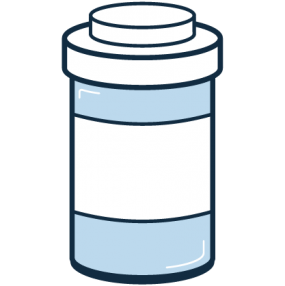How to Use Bupropion SR
There are seven medicines approved by the Food and Drug Administration (FDA) to help you quit. They work in different ways. All have been shown to be safe and effective for adults who smoke cigarettes.
These quit-smoking medicines include nicotine replacement medicines (the nicotine patch, lozenge, gum, oral inhaler, and nasal spray) and pill medicines (varenicline and bupropion SR).
Some other strategies, with or without medicines, can help you quit as well.

Bupropion is a pill that does not contain nicotine. You need a prescription for it. It works differently than other quit-smoking medicines and may be a good option for people who have tried using other medicines to quit before but haven’t been able to quit successfully.
You take bupropion twice a day. Start it 1-2 weeks before quitting. Your doctor or pharmacist can give you detailed instructions on how to use it. They can also help you set and adjust your dose.
- You’ll need a prescription from a prescribing healthcare provider for bupropion SR (sustained release). Take bupropion exactly as directed by your healthcare provider.
- Bupropion SR is a tablet (pill) that comes in one dosing strength: 150 mg. The tablet does not contain nicotine. Bupropion can also be prescribed for uses other than for quitting smoking.
- Your doctor or other healthcare provider will help you decide when to start taking bupropion. In general, most people start taking bupropion about 1-2 weeks before their quit date.
- Your doctor or other healthcare provider will give you dosing instructions. Most people are started on a lower dose at first to reduce the risk of certain side effects:
- Days 1 to 3: Take 1 tablet (150 mg) each day.
- Days 3 until the end of treatment: Take two tablets (150 mg each) per day – one in the morning and one in the evening, at least 8 hours apart.
- Try to take bupropion at the same time every day. The two doses should always be separated by at least eight hours. Do not take more than two tablets per day.
- Bupropion can be taken with or without food. Do not crush, chew, or divide bupropion tablets.
- If you miss a dose of bupropion, take it as soon as you remember, and take the missed dose for that day at least eight hours later. If it is almost time for the next dose, skip the dose you forgot and continue your regular dosing schedule. It is very important that you have at least 8 hours between doses, and that you do not exceed two doses in a 24-hour period.
- Most people take bupropion SR for 12 weeks. Your healthcare provider might prescribe bupropion for longer, if needed.
- Bupropion can have side effects:
- Tell your prescribing healthcare provider about any other medications you may be taking. Certain commonly used medications can increase your chances of serious side effects from bupropion.
- Be careful when driving or operating machinery until you know how bupropion may affect you. Some people may feel sleepy, dizzy, or have trouble concentrating.
- If you are taking bupropion and experience hostility, agitation, depression, suicidal thoughts, or changes in how you act that you don’t think are due to quitting smoking, you should stop taking the medicine and talk to your doctor right away. Get emergency medical help if needed.
- Tell your doctor or other healthcare provider immediately if you have any medical conditions that may cause seizures or are taking any medicines that may increase the risk of seizures. Bupropion may increase this risk.
- Limit or avoid alcohol during treatment with bupropion. Using alcohol while taking bupropion may increase the risk of certain side effects.
- Keep out of reach of children and pets. In case of accidental use or ingestion of bupropion, or in case you take too many bupropion tablets in a 24 hours period, contact a Poison Control Center (1-800-222-1222) and/or visit an emergency room right away.
- Quitting smoking may make some people depressed or anxious, whether quitting with medication or not. Get help if you have feelings of depression or anxiety that last for more than two weeks or that get worse.
- Learn more about bupropion SR, including side effects and precautions.

Photo from mayoclinic.org used with permission of Mayo Clinic; no product endorsement implied.
- Bupropion SR can be combined with nicotine patches under the care of your doctor or other healthcare provider
- What if I have trouble sleeping while taking bupropion? Sleep disturbances are a side effect from taking bupropion. To minimize this, you can avoid taking bupropion SR before bed and instead use a schedule where you take it right after waking, and again eight hours later (e.g., in the afternoon, depending on when you wake).
- For best results, use bupropion as part of a program that includes coaching support. Talk with your healthcare provider and connect with your state tobacco quitline (1-800-QUIT-NOW) for support.
Bupropion is a pill you take twice a day. You start it 1-2 weeks before quitting. It does not contain nicotine, so it works differently than nicotine replacement medicines.
- Simple to use so may be easier to stick with it.
- May help delay weight gain associated with quitting.
- If you have depression, it may help.
- Can be combined with nicotine patches under the care of your doctor or other healthcare provider.
- More possible side-effects than other medicines.
- Cannot be used if you have ever had bulimia or anorexia, a seizure disorder, or are taking or recently quit taking an MAO inhibitor medicine. They are sometimes taken for depression. Check with your pharmacist or doctor if you are unsure.
- Requires a prescription.
Possible Side Effects (talk to your doctor or other healthcare provider about what you can do for these):
- Nausea, dizziness (try taking with food, drink plenty of water).
- Difficulty sleeping (take evening dose in late afternoon at least 8 hours after morning dose).
- Constipation, dry mouth (drink plenty of water, try sugarless gum).
- Rash (stop taking and talk to your doctor).
- Low risk of seizures (one person in a thousand – stop taking and talk to your doctor immediately).
- Nervousness, difficulty concentrating (talk to your doctor).
- Changes in your mood or behavior (rare – see precautions).
Bupropion SR Contraindications and Precautions (If any of these apply to you, talk to your doctor or other healthcare provider before starting to take bupropion.):
- A history of seizures.
- Already using bupropion for another reason.
- A history of bulimia or anorexia.
- Abruptly stopping use of sedating medicines or alcohol while taking bupropion.
- Taking or recently quit taking a type of medicine called an MAO inhibitor.
- Taking a medicine that makes you more prone to seizures.
- Liver disease.
- Could be pregnant or are breastfeeding.
- Less than 18 years old.
In addition, if you decide to take bupropion and experience hostility, agitation, depression, suicidal thoughts, or changes in how you act that you don’t think are due to quitting smoking, you should stop taking the medicine and talk to your doctor right away.
More precautions and general information are available about bupropion.
- You’ll need a prescription from a prescribing healthcare provider for bupropion SR (sustained release). Take bupropion exactly as directed by your healthcare provider.
- Bupropion SR is a tablet (pill) that comes in one dosing strength: 150 mg. The tablet does not contain nicotine. Bupropion can also be prescribed for uses other than for quitting smoking.
- Your doctor or other healthcare provider will help you decide when to start taking bupropion. In general, most people start taking bupropion about 1-2 weeks before their quit date.
- Your doctor or other healthcare provider will give you dosing instructions. Most people are started on a lower dose at first to reduce the risk of certain side effects:
- Days 1 to 3: Take 1 tablet (150 mg) each day.
- Days 3 until the end of treatment: Take two tablets (150 mg each) per day – one in the morning and one in the evening, at least 8 hours apart.
- Try to take bupropion at the same time every day. The two doses should always be separated by at least eight hours. Do not take more than two tablets per day.
- Bupropion can be taken with or without food. Do not crush, chew, or divide bupropion tablets.
- If you miss a dose of bupropion, take it as soon as you remember, and take the missed dose for that day at least eight hours later. If it is almost time for the next dose, skip the dose you forgot and continue your regular dosing schedule. It is very important that you have at least 8 hours between doses, and that you do not exceed two doses in a 24-hour period.
- Most people take bupropion SR for 12 weeks. Your healthcare provider might prescribe bupropion for longer, if needed.

- Bupropion can have side effects:
- Tell your prescribing healthcare provider about any other medications you may be taking. Certain commonly used medications can increase your chances of serious side effects from bupropion.
- Be careful when driving or operating machinery until you know how bupropion may affect you. Some people may feel sleepy, dizzy, or have trouble concentrating.
- If you are taking bupropion and experience hostility, agitation, depression, suicidal thoughts, or changes in how you act that you don’t think are due to quitting smoking, you should stop taking the medicine and talk to your doctor right away. Get emergency medical help if needed.
- Tell your doctor or other healthcare provider immediately if you have any medical conditions that may cause seizures or are taking any medicines that may increase the risk of seizures. Bupropion may increase this risk.
- Limit or avoid alcohol during treatment with bupropion. Using alcohol while taking bupropion may increase the risk of certain side effects.
- Keep out of reach of children and pets. In case of accidental use or ingestion of bupropion, or in case you take too many bupropion tablets in a 24 hours period, contact a Poison Control Center (1-800-222-1222) and/or visit an emergency room right away.
- Learn more about bupropion SR, including side effects and precautions.
For more help using medicines to quit smoking, call 1-800-QUIT-NOW or visit CDC.gov/quit. Talk with your healthcare provider about the best medicine for you. Using medicine together with behavioral counseling gives you the best chance of quitting smoking.

Photo from mayoclinic.org used with permission of Mayo Clinic; no product endorsement implied.
- Bupropion SR can be combined with nicotine patches under the care of your doctor or other healthcare provider
- What if I have trouble sleeping while taking bupropion? Sleep disturbances are a side effect from taking bupropion. To minimize this, you can avoid taking bupropion SR before bed and instead use a schedule where you take it right after waking, and again eight hours later (e.g., in the afternoon, depending on when you wake).
- For best results, use bupropion as part of a program that includes coaching support. Talk with your healthcare provider and connect with your state tobacco quitline (1-800-QUIT-NOW) for support.



